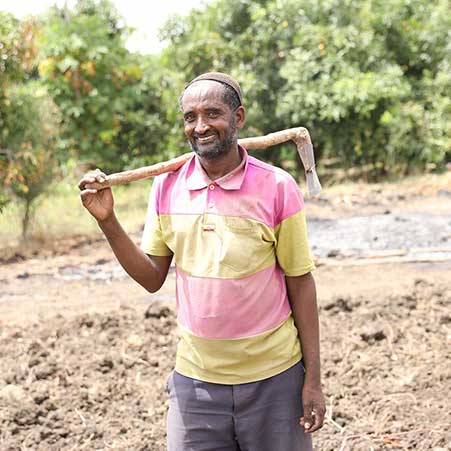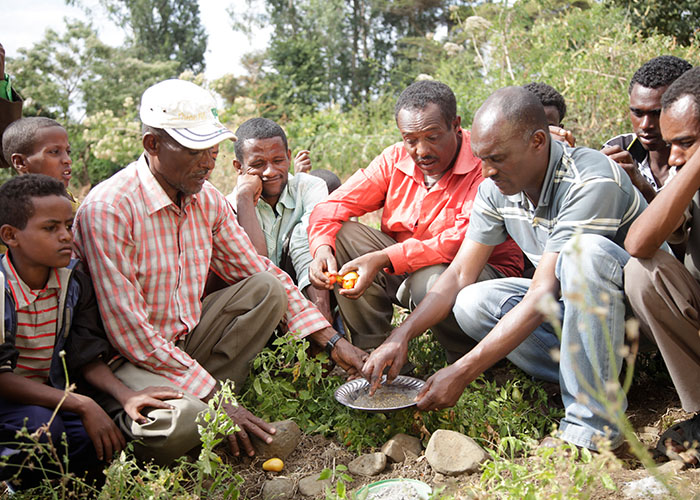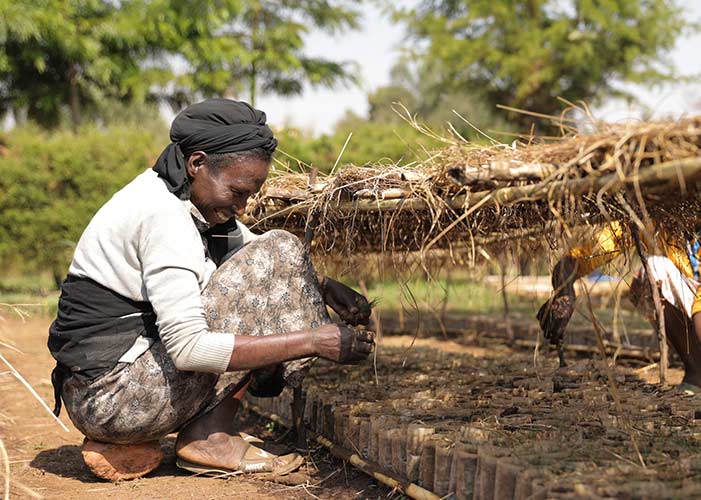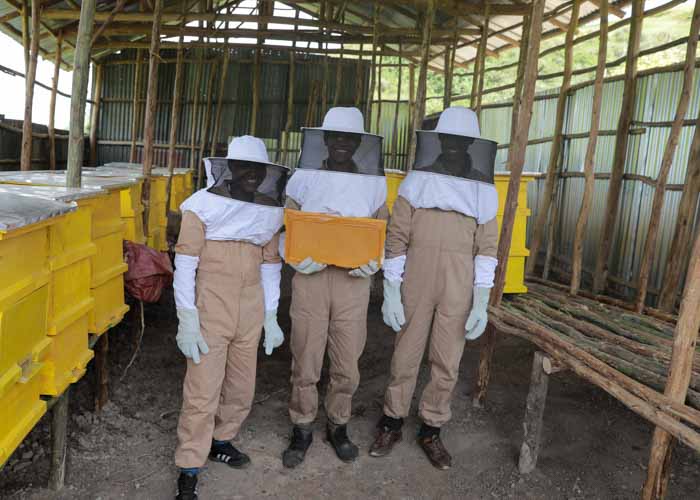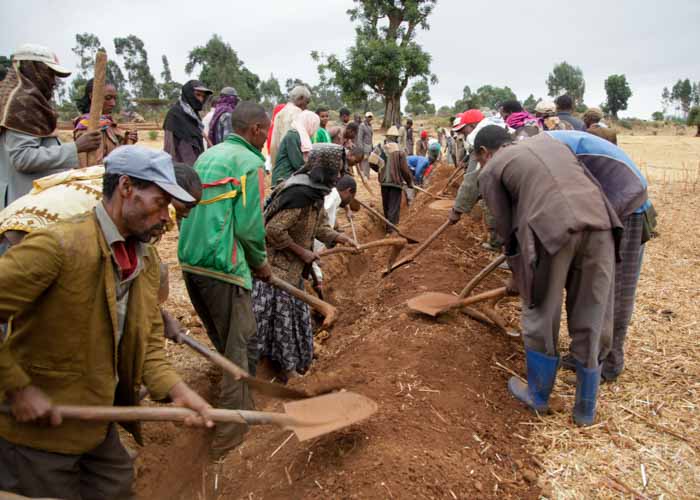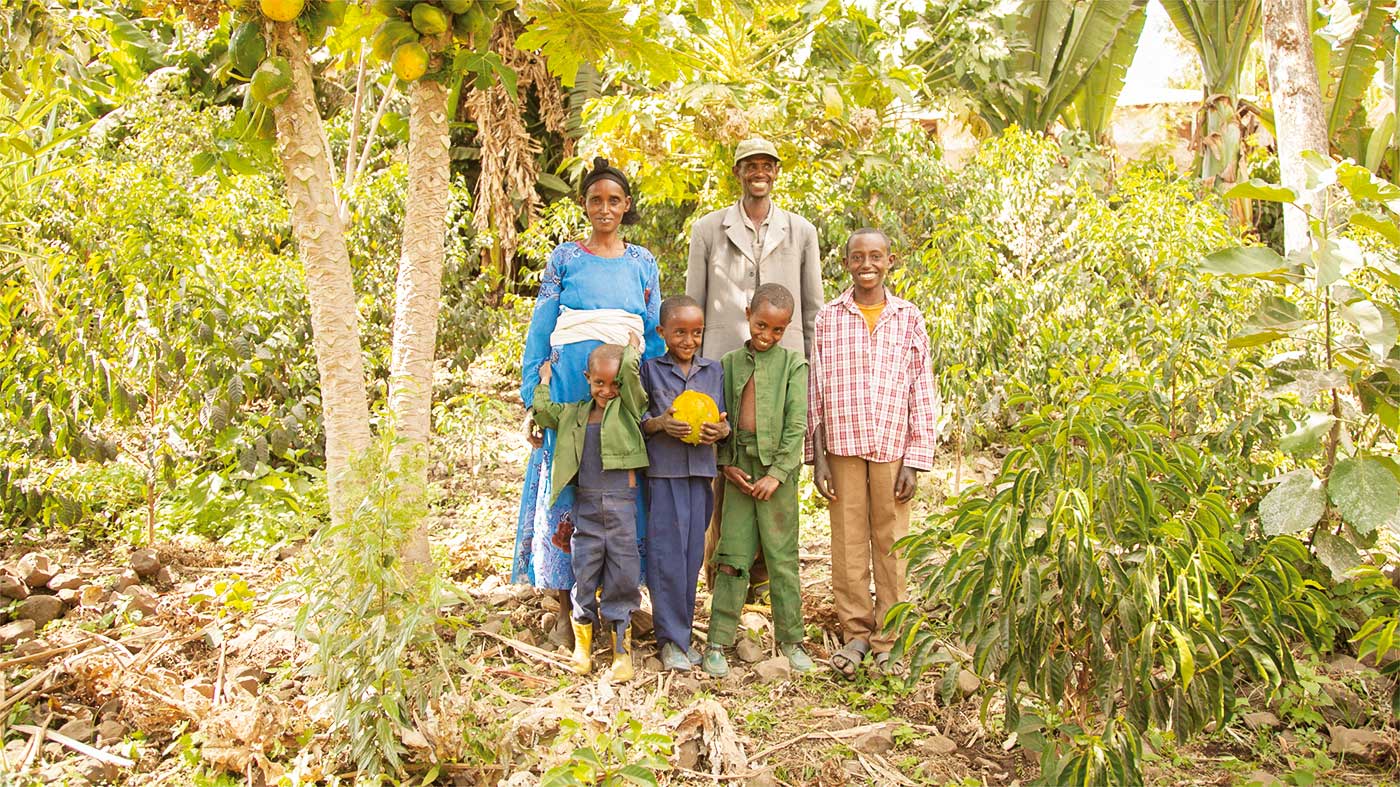
Agriculture
"Environmental protection and food security go hand in hand. These are the seeds that bear fruit."
Three out of every four Ethiopians depend on agriculture and live from the yields of their tiny smallholdings. But harvests are worsening due to the use of outdated farming practices while there is also erosion and depletion of soils. Working in collaboration with the local population, we introduce measures designed to protect natural resources and also provide courses in better farming methods.
Help us to secure the nutrition of families and promote afforestation in Ethiopia! As people for people.
Help us to secure the nutrition of families and promote afforestation in Ethiopia! As people for people.
Fruit and vegetables can change lives! And those living in our project areas will tell you about the extent that this is the case:
A supply of fruit tree seedlings and vegetable seeds can make a big difference to the lives of Ethiopian families. The produce supplements their otherwise monotonous diets and counteracts malnutrition.
Children, nursing mothers and those with impaired immune systems particularly need a vitamin-rich diet to stay healthy. Once a family's own need is covered, any surplus can be sold at the local market, thus providing additional income.
Children, nursing mothers and those with impaired immune systems particularly need a vitamin-rich diet to stay healthy. Once a family's own need is covered, any surplus can be sold at the local market, thus providing additional income.
Agriculture that fills stomachs
The failure of one single harvest can represent a major threat to the survival of the families in our project areas. We are thus busy introducing measures designed to provide for sustainable sources of food. The cultivation of coffee, fruits and vegetables enables people to improve their income and establish a secure livelihood. This approach also helps offset failures of other crops.Better yields and an increased income help families build up reserves that they can invest to improve their own agricultural production over the long term. For example, by purchasing seedlings or oxen for ploughing.
Together we can give people in Ethiopia what they really need: not simply handouts that will help them survive for just another day but the opportunity to support themselves and their families using their own efforts.
Agriculture that fills stomachs
The failure of one single harvest can represent a major threat to the survival of the families in our project areas. We are thus busy introducing measures designed to provide for sustainable sources of food. The cultivation of coffee, fruits and vegetables enables people to improve their income and establish a secure livelihood. This approach also helps offset failures of other crops.Better yields and an increased income help families build up reserves that they can invest to improve their own agricultural production over the long term. For example, by purchasing seedlings or oxen for ploughing.
Together we can give people in Ethiopia what they really need: not simply handouts that will help them survive for just another day but the opportunity to support themselves and their families using their own efforts.
What we do:
Our activities in our focal area of sustainable land management are as follows:
Courses in farming, irrigation and soil conservation techniques
Distribution of vegetable seeds and fruit tree seedlings
Establishment of tree nurseries and cultivation of tree seedlings
Creation of large-scale afforestation and reforestation areas
Erosion control e.g. by terracing, filling of erosion ditches with gabions
Distribution of fuel-efficient stoves
Introduction of garden plot concepts
Introduction of improved beehives and more productive hens
Introduction of breeding cattle and improvement of the veterinary services for the animals
Courses for food preparation and processing
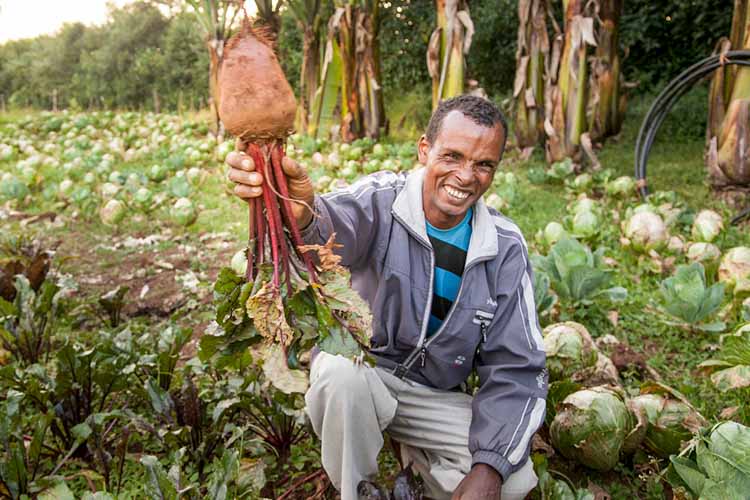

Knowledge puts out new outgrowths
Farming techniques and insights into modern cultivation methods can make significant differences to the nutritional situation of families. We thus offer courses for farmers in which, for example, they learn how to terrace and cultivate their fields in order to increase yields.
The families also have access to better quality seeds and to types of fruits and vegetables that many living in the villages have never seen before, including carrots, swiss chard, cabbage, beetroot and tomatoes. This means that they not only have a better diet, but the new, vitamin-rich foods also impact positively on their health.
Moreover, we also support the establishment of innovative projects, such as apiculture and mushroom growing cooperatives that provide young people especially with an alternative form of agricultural income.
The families also have access to better quality seeds and to types of fruits and vegetables that many living in the villages have never seen before, including carrots, swiss chard, cabbage, beetroot and tomatoes. This means that they not only have a better diet, but the new, vitamin-rich foods also impact positively on their health.
Moreover, we also support the establishment of innovative projects, such as apiculture and mushroom growing cooperatives that provide young people especially with an alternative form of agricultural income.
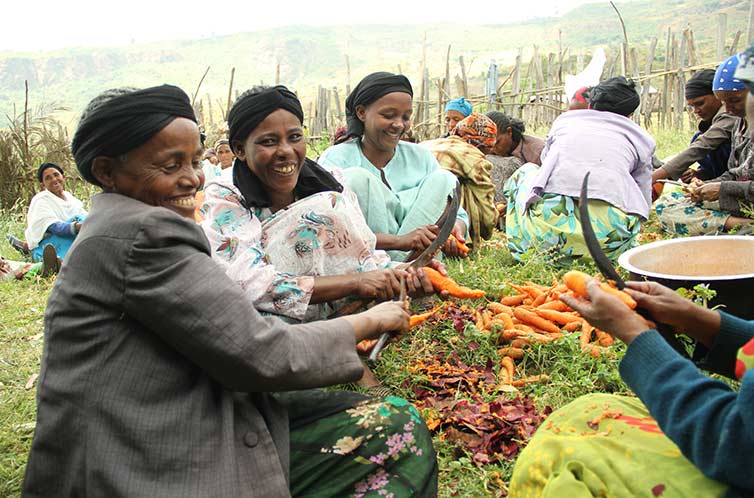

Food preparation: putting vegetables on the table
New types of fruits and vegetables not only help improve health but also add diversity to what is very often a meagre and one-sided diet. However, the variety of produce available in our project areas is often limited. Vegetables with which we are familiar, such as carrots, beetroot and tomatoes, are unknown in the more remote regions.
To make sure that these new ingredients actually appeal to people, not just the health aspects but the flavour factors need to be taken into account. And this is why we offer food preparation courses in which women learn how to correctly prepare, store and preserve these new provisions. They also learn about the vitamin contents in fruits and vegetables and their positive influence on health.
Important topics such as the appropriate diet for pregnant women and nursing mothers, children's health and family planning are also dealt with in our courses.
To make sure that these new ingredients actually appeal to people, not just the health aspects but the flavour factors need to be taken into account. And this is why we offer food preparation courses in which women learn how to correctly prepare, store and preserve these new provisions. They also learn about the vitamin contents in fruits and vegetables and their positive influence on health.
Important topics such as the appropriate diet for pregnant women and nursing mothers, children's health and family planning are also dealt with in our courses.
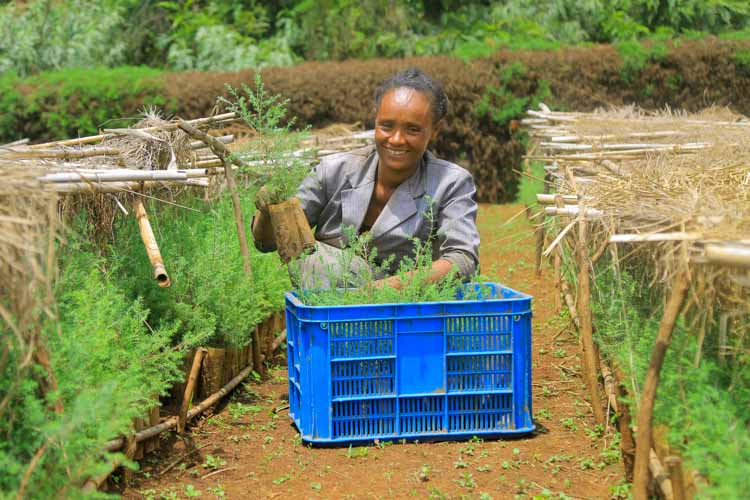

Roots for the future
In today's Ethiopia, just 15% of the surface area is forest. Deforestation and its consequences have become a major problem for the country that has had negative effects on agriculture and the situation of its people. Tree roots help compact soil and retain fertile humus, prevent its erosion and supply important nutrients.
We are introducing numerous measures to enable Mother Nature to get back on her feet again in our project areas. These include large scale reforestation projects in collaboration with the local population, education in the relevance of afforestation and nature conservation and the issue of green, fuel-efficient stoves. With every planted tree, we get a little bit closer to our objective – the creation of a fertile, productive Ethiopia.
Please click here for more information on our afforestation projects.
We are introducing numerous measures to enable Mother Nature to get back on her feet again in our project areas. These include large scale reforestation projects in collaboration with the local population, education in the relevance of afforestation and nature conservation and the issue of green, fuel-efficient stoves. With every planted tree, we get a little bit closer to our objective – the creation of a fertile, productive Ethiopia.
Please click here for more information on our afforestation projects.
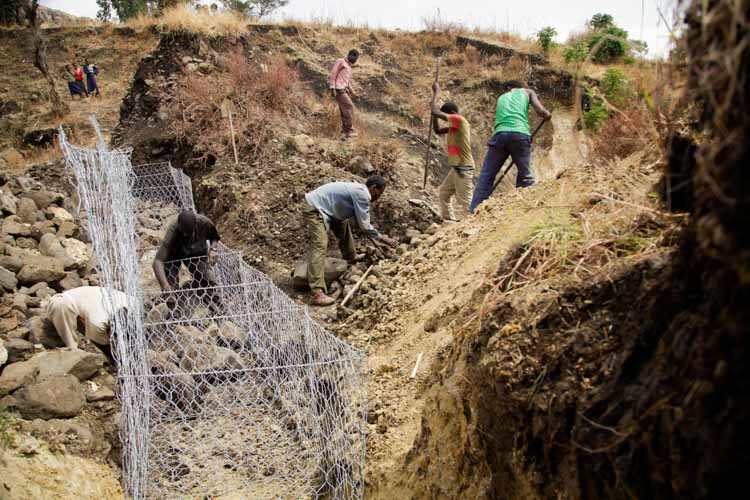

Filling ditches and preventing soil loss
Soil erosion is a massive problem in Ethiopia: the loss of trees means their roots are no longer there to hold the soil in place and it is worn away by wind and rain. The consequences are disastrous: deep erosion ditches have developed, land that could be used for cultivation has been lost and farmers are quite literally losing ground.
We help families protect their soil – the very basis of their existence. Working with the local people, we construct walls made of stone-filled baskets, so-called gabions, to fill erosion ditches. When it rains, soil that is washed from fields accumulates against these walls and refills the ditches. Also planted in erosion ditches are trees, shrubs and deep-rooting vetiver grass that consolidate soil. Not only the environment but the livelihood of families is thus protected.
We help families protect their soil – the very basis of their existence. Working with the local people, we construct walls made of stone-filled baskets, so-called gabions, to fill erosion ditches. When it rains, soil that is washed from fields accumulates against these walls and refills the ditches. Also planted in erosion ditches are trees, shrubs and deep-rooting vetiver grass that consolidate soil. Not only the environment but the livelihood of families is thus protected.
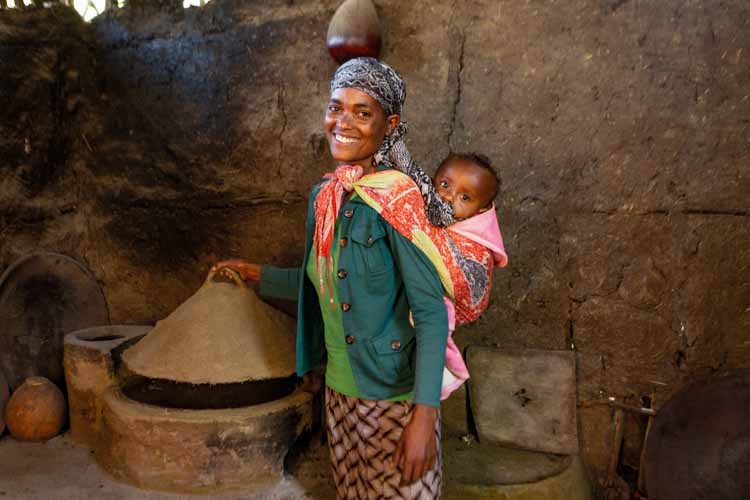

A stove is the heart of a home
But what have stoves to do with environmental protection? Actually, a great deal in our project areas! In Ethiopia, the traditional way of cooking food is to use a fireplace consisting of a clay slab placed on three stones. Of course, this method consumes plenty of firewood and kindling. But wood is all too often a rare commodity in Ethiopia. Women and girls are routinely busy for hours collecting firewood.
We provide "green stoves" for the use of the families in our project areas. These need half as much firewood as the traditional cooking fires. This means women have more time at their disposal, so they can attend educational courses or even establish their own businesses.
In addition, this counteracts deforestation, the associated soil erosion and provides for better health – an important measure that benefits not just the environment but also women in Ethiopia.
We provide "green stoves" for the use of the families in our project areas. These need half as much firewood as the traditional cooking fires. This means women have more time at their disposal, so they can attend educational courses or even establish their own businesses.
In addition, this counteracts deforestation, the associated soil erosion and provides for better health – an important measure that benefits not just the environment but also women in Ethiopia.
